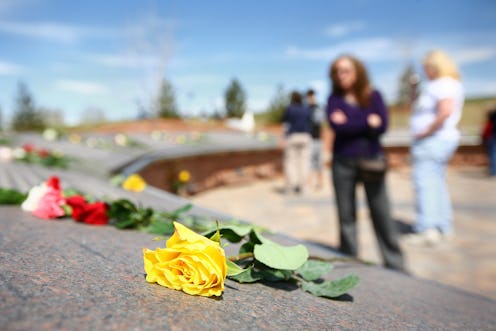News
This Is How People Are Remembering The Victims Of Columbine, 19 Years Later

Friday marks 19 years since the Columbine massacre took place in Littleton, Colorado. Though few at the time imagined such a tragedy could ever be repeated, school shootings have become horrifyingly routine. So, for many pushing for gun control reform, remembering the victims of Columbine is imperative — and they're doing so in a number of ways.
On Wednesday night, students of Columbine came together with students from Marjory Stoneman Douglas High School for a joint rally. They met in a park not far from Columbine High School, with 60 Parkland students making the trip to Colorado for the event, billed as "Vote for Our Lives." The main focus for many of the speakers was gun control reform.
"This nation should have realized that the right to live, the right to feel safe is more important than the right to bear arms 19 years ago," Carlos Rodriguez said, as reported by CNN. He's one of the survivors of the Parkland shooting, and he represented Stoneman Douglas at the Vote for Our Lives rally.
Current students of Columbine are always given April 20 off, in commemoration of the 1999 tragedy. In lieu of attending school, students have traditionally been encouraged to participate in community service.
But for the students outside Columbine High School, April 20 will be marked by the second mass student walkout in as many months. Following the March 14 walkout — scheduled one month after the Feb. 14 shooting at Stoneman Douglas left 17 dead — students across the nation will leave class again at 10 a.m. in their respective time zones.
Dubbed the National School Walkout Day, the event was organized by a high school sophomore in Connecticut. Lane Murdock was motivated to do something proactive after the Parkland shooting, noting to NPR that she initially felt just "numb" at reports of the deadly attack on young people. For Murdock and her team of student peers, gun violence has been so prevalent that there's widespread desensitization to it — especially among young people. "We should be horrified, and we’re not anymore. It’s American culture," she told CNN. (NPR notes Murdock was born three years after Columbine.)
Across the nation, over 2,500 walkout events have been registered with Murdock's organization. Prominent Parkland activist David Hogg has tweeted there will be one minute and 13 seconds of silence after the walkout, in honor of the Columbine victims.
Undoubtedly, social media has been a boon to student activists advocating for change, particularly the teens from Stoneman Douglas. As NPR reports, there were student survivors of Columbine who went to Washington the summer after the shooting, asking for many of the same policy changes — raising the age of gun purchases to 21, for instance, and requiring background checks for all gun buys.
But "there was no Facebook. There was no social media. There was no way to capture the world's attention," Columbine teacher Paula Reed told NPR. It's given her — and many others — reason to believe the reach provided by social media will make things different this time.
"I am not willing to accept that this is the new normal." That's Austin Eubanks, speaking in a video for AJ+ posted today. He was shot twice during the Columbine shooting, and his best friend died next to him. "After Columbine, we had no frame of reference for what a mass shooting was," Eubanks goes on. "We have to effect change now to where future generations won't be affected by these tragedies."
Eubanks, like the Parkland survivors and the thousands of students expected to walk out of class today on the 19th anniversary of Columbine, wants to see gun control reform happen — now.